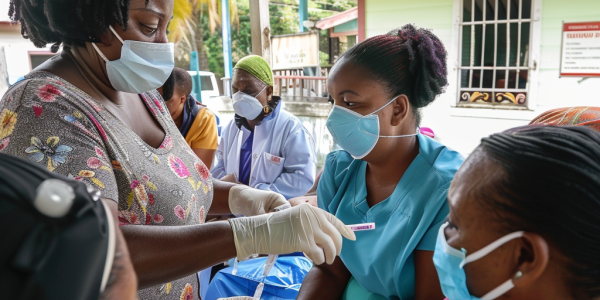COVID-19 and Dengue Fever Outbreaks Challenge St. Vincent’s Health System
St. Vincent is facing a surge in COVID-19 cases, reporting 89 new infections in July 2024, alongside a dengue fever outbreak with 119 confirmed cases. Prime Minister Ralph Gonsalves emphasizes the need for swift testing and vaccination to combat these dual health crises, urging residents to adhere to safety protocols and consider vaccination as a critical preventive measure.
Study Links Stock Market Volatility to Increased Health Risks
A recent study from Fudan University reveals a troubling link between stock market volatility and increased health risks, including heart attacks, strokes, and suicides. Analyzing data from over 12 million deaths in China, researchers found that even minor fluctuations in stock prices can significantly impact mortality rates. The findings highlight the psychological stress of financial instability and its dire implications for public health, urging investors and policymakers to consider strategies to mitigate these risks.
New Insights into Immune Responses: Mast Cells and Neutrophils Interact in Allergic Reactions
Recent research from the Max Planck Institute reveals groundbreaking insights into the immune system, highlighting the unexpected interaction between mast cells and neutrophils during allergic reactions. This study uncovers how mast cells can capture living neutrophils, enhancing our understanding of inflammation and potential therapeutic strategies for allergic diseases.
Top Zinc-Rich Foods to Boost Your Health
Discover the top zinc-rich foods to enhance your health, including oysters, red meat, poultry, beans, nuts, dairy, whole grains, dark chocolate, fortified foods, and shellfish. Learn how to easily incorporate these essential sources of zinc into your diet for improved immune support and overall well-being.
Revolutionary EpiSign Technology Transforms Diagnosis of Rare Diseases with Blood Test
Researchers at the London Health Sciences Centre and Lawson Health Research Institute have introduced EpiSign, a groundbreaking blood test utilizing artificial intelligence to diagnose over 100 rare diseases and birth disorders. This innovative technology analyzes a patient’s epigenome, offering hope for accurate diagnosis and early intervention in complex conditions like recurrent constellation of embryonic malformations (RCEMs). EpiSign represents a significant advancement in medical diagnostics, paving the way for improved patient care and personalized treatment strategies.
New Study Reveals Complex Dynamics of Phage Infections and Their Implications
A groundbreaking study by researchers from the University of Illinois Urbana-Champaign and Texas A&M University reveals new insights into phage infections and their impact on bacterial cells. Published on August 5, 2024, this research explores how multiple phages interact during infection, potentially influencing phage therapy as an alternative to antibiotics. The findings highlight the complex dynamics of phage biology, with implications for both medical and ecological applications.
Florida Faces RSV Season Challenges Amid Rising Youth Mental Health Crisis
As Florida enters its RSV season, health experts warn of a potential surge in Respiratory Syncytial Virus cases, particularly affecting vulnerable populations. With many older adults unvaccinated, the risk of severe illness and hospitalizations increases. Additionally, a rising mental health crisis among youth, highlighted by increasing suicide rates, underscores the urgent need for better resources and support. Communities must prioritize vaccination, mental health awareness, and proactive health measures to navigate these challenges.
New Cardiovascular Risk Calculator Sparks Concerns Over Treatment Eligibility
A new cardiovascular risk calculator from Harvard Medical School promises improved accuracy in predicting heart attacks and strokes. However, recent research warns that nearly 16 million individuals may become ineligible for essential treatments, potentially leading to an increase of 107,000 heart attacks and strokes over the next decade. This study emphasizes the urgent need for reevaluation of treatment guidelines to ensure effective patient care.
WHO Raises Alarm Over New Lethal Monkeypox Strain Outbreak
The World Health Organization (WHO) warns of a potential international emergency due to a new and lethal strain of monkeypox from the Democratic Republic of Congo. With over 11,000 cases reported and 450 fatalities, WHO Director-General Tedros Adhanom Ghebreyesus is considering reconvening an expert committee to assess the outbreak’s severity and potential declaration as a Public Health Emergency of International Concern (PHEIC). The global health community is urged to remain vigilant as the situation develops.
Flu Deaths in Scotland Double Amid Declining Vaccination Rates
Flu-related deaths in Scotland have more than doubled in 2023, with 336 fatalities reported, raising concerns about declining vaccination rates. Public Health Scotland highlights the importance of flu vaccinations, especially as winter approaches. Health experts urge the public to prioritize flu shots to protect vulnerable populations and mitigate the impact of influenza outbreaks.










